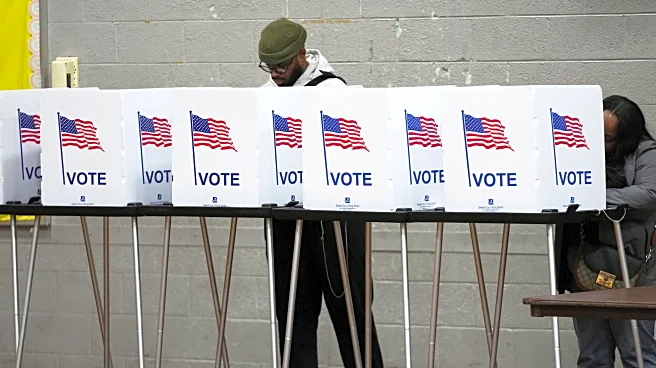What's Happening?
President Trump has announced plans to deploy additional troops to U.S. cities as part of a national crackdown on crime. Speaking aboard the USS George Washington in Japan, Trump emphasized the need for safe cities, stating that the National Guard and
potentially more troops would be sent to address urban crime issues. This initiative, initially focused on Washington, D.C., has expanded to include cities like Los Angeles, Chicago, Memphis, and Portland, leading to protests and legal challenges. The White House aims to position Trump and the Republican Party as strong on crime, contrasting with Democrats, whom they accuse of being lenient. Despite a 30-year low in violent crime in some areas before the National Guard's arrival, the administration continues to push this narrative.
Why It's Important?
The deployment of troops to combat crime in U.S. cities is a significant political move that could influence the upcoming midterm elections. While FBI data indicates a decrease in violent crime, public perception, as shown by a Gallup poll, suggests that many Americans believe crime is on the rise. This discrepancy highlights the potential for crime to be a pivotal issue in political campaigns. The strategy may bolster support among Republican voters who prioritize law and order, but it also risks alienating others who view the use of federal troops as excessive. The political divide on this issue is stark, with Republicans largely supporting the troop deployment and Democrats opposing it.
What's Next?
As the midterm elections approach, the effectiveness and public reception of Trump's crime crackdown will likely be scrutinized. The administration may continue to emphasize this issue to rally its base, while Democrats could challenge the legality and ethics of using federal troops in domestic law enforcement. The ongoing protests and legal battles in affected cities may also shape public opinion and influence voter turnout. Political analysts will be watching closely to see if this strategy translates into electoral gains for the Republican Party.
Beyond the Headlines
The use of federal troops in domestic crime control raises questions about the balance between national security and civil liberties. Critics argue that this approach could set a precedent for military involvement in civilian matters, potentially eroding trust in local law enforcement. Additionally, the focus on crime may overshadow other pressing issues such as economic recovery and healthcare, which could have long-term implications for public policy priorities.
















